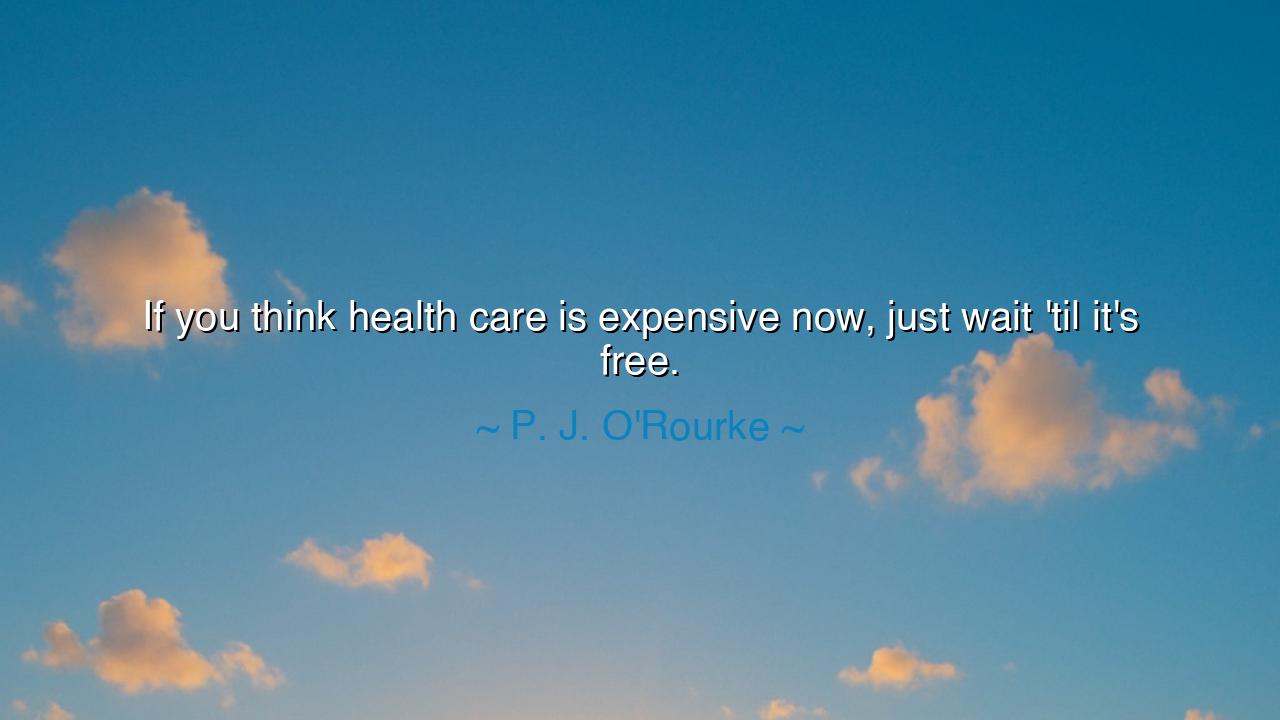
If you think health care is expensive now, just wait 'til it's






In the sharp and satirical words of P. J. O’Rourke, the American writer and humorist who cloaked deep wisdom in wit, we find a warning that resounds far beyond its jest: “If you think health care is expensive now, just wait ’til it’s free.” Though the phrase is veiled in humor, its meaning pierces with truth. It is a reflection on the nature of human systems — that nothing in this world is truly free, and that when cost is hidden, the price is often greater still. Beneath the laughter of O’Rourke’s pen lies a profound meditation on responsibility, value, and the eternal balance between freedom and dependency.
To understand this quote, one must first see the paradox it unveils. Health care, a sacred duty of civilization, must balance compassion with practicality. When O’Rourke speaks of “free” care, he does not mock the poor or the sick, but rather warns of the illusion of free gifts. For nothing that is built by human hands — be it a loaf of bread or the healing hand of a physician — comes without labor, time, or sacrifice. When something becomes “free,” it merely means the cost has been moved elsewhere — from the individual to the many, from the visible to the unseen. And what is unseen, the ancients knew, is often the most dangerous.
This truth has echoed throughout the ages. In the great empire of Rome, the rulers, seeking to please the masses, offered free grain to the people — the famous annona. At first, it seemed a blessing: the poor were fed, and peace was maintained. But over time, dependency grew. The people began to expect the gift without gratitude, and the farmers who toiled to produce the grain were crushed by taxes. The empire’s strength — its self-reliance and civic duty — weakened beneath the weight of its own generosity. What began as charity became burden, and the empire, once mighty, eroded from within. O’Rourke’s words echo this same wisdom: that good intentions, ungoverned by prudence, may sow the seeds of ruin.
Yet his message is not a condemnation of compassion, but a call for wisdom. To care for the sick and the poor is noble and necessary, but to do so without structure or accountability invites waste, corruption, and decay. When something precious is offered without cost, it is too easily taken for granted. The physician’s art becomes a bureaucracy; the patient’s gratitude becomes expectation. Thus, O’Rourke warns not of generosity itself, but of its distortion — when help becomes entitlement and stewardship is lost.
Consider the story of postwar Britain, whose noble effort to provide universal care through the National Health Service lifted millions from suffering. Yet as decades passed, the system grew heavy with demand. Endless queues, shortages of doctors, and failing infrastructure became the hidden cost of “free” care. The people, grateful yet weary, discovered that the burden of cost had not vanished; it had merely shifted — from pocket to policy, from coin to time, from individual to state. O’Rourke’s wit, though American, spoke to this universal truth: that no system, however compassionate, can escape the laws of effort and exchange.
From this truth arises the ancient virtue of balance. The wise must learn to walk the line between care and caution, between generosity and discipline. Just as a healer must know when to administer medicine and when to let nature heal, so must a society discern when to give freely and when to call its citizens to bear the cost together. Freedom, too, is not free — it demands vigilance, participation, and self-responsibility. The people who rely entirely on the state for their welfare risk forgetting their own strength, just as a muscle unused grows weak.
Thus, let this teaching be carried forward: value what you are given, and understand its price, even when unseen. Whether it be health, wealth, or liberty, nothing endures without the effort to sustain it. If health care is to serve all, let it be built not upon illusion, but upon truth — where every citizen gives what they can, and receives what they must, in fairness and gratitude. O’Rourke’s laughter, though biting, hides a plea for stewardship: to remember that the wealth of a nation lies not in free gifts, but in the character of those who build and preserve them.
So heed the humor and the wisdom entwined in his words: “If you think health care is expensive now, just wait ’til it’s free.” For the ancients would tell us — there is no harvest without sowing, no healing without sacrifice. Let every generation remember that true compassion walks hand in hand with wisdom, and that the strength of a people is not in what they are given, but in how they give, share, and sustain the blessings of life — together, in truth, and in responsibility.






AAdministratorAdministrator
Welcome, honored guests. Please leave a comment, we will respond soon